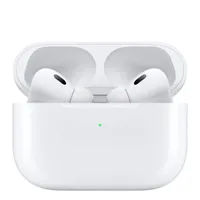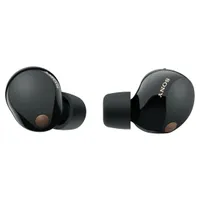TechRadar Verdict
The Samsung Galaxy Buds 3 Pro offer great-sounding audio quality, top-notch ANC and a premium, though derivative, design. There's a lot to like! Some key upgrades over their predecessors fix many of our issues, though other features added don’t exactly impress – especially when they're only accessible to owners of Samsung's most recent Galaxy devices. And there's another issue at play here: the chunky price tag.
Pros
- +
Fantastic sound
- +
Thorough ANC
- +
Lightweight design
Cons
- -
High price
- -
Removing eartips is a fuss
- -
Key features require a newer Galaxy phone
Why you can trust TechRadar
Samsung Galaxy Buds 3 Pro: Two-minute review
People are quick to label any stem-toting wireless earbud as ‘AirPods clones’ but Samsung isn’t doing itself any favors to deflect the term with its Galaxy Buds 3 Pro. They look like what you'd get if you threw Apple’s earbuds and a Toblerone into a blender. Can we see past their oh-so-familiar design if they're the best earbuds out there? Of course. But let's not jump the gun.
The Samsung Galaxy Buds 3 Pro are Samsung’s new-for-2024 top-end earbuds, launched alongside the Galaxy Z Fold 6 and Z Flip 6 at a launch event in July of the year, and they fill a void in the company’s line-up given that the Buds 2 Pro were getting long in the tooth.
If you know anything about Samsung’s line-up, you’re probably expecting big things from a product boasting the Korean tech giant’s name, as well as the word ‘Pro’ thrown in for good measure, and you won't be left high and dry with the Samsung Galaxy Buds 3 Pro.
Frankly, these earbuds sound fantastic, with some of the best sound in any earbuds I’ve tested. The V-shaped audio means you’re getting meaty bass but also defined treble, so whether you’re listening to the highest opera or the lowest synthwave you’re going to be enjoying your music.
There’s no need to worry about background noises getting in the way either, with the powerful noise cancellation of the buds doing an amazing job at eradicating noises around you. I was really impressed with how the Buds 3 Pro didn’t just reduce the prominence of noises around me, but stopped me noticing many of them at all.
And I know I’ve been down on the AirPods’ – sorry, the Galaxy Buds’ – design, but it’s a popular shape in the wireless earbuds sector for a reason. The Buds 3 Pro are comfortable to wear, are light enough that they stay stuck in your ear and look pretty svelte too.
Some issues from our Galaxy Buds 2 Pro have been fixed too, including my personal sticking point: the low battery life. The Buds 3 Pro last a little longer in use but the case battery life has seen more noticeable increases, making the 3 Pro much better suited for longer journeys.
Sign up for breaking news, reviews, opinion, top tech deals, and more.
That’s a lot of praise, but it’s worth noting that the Samsung Galaxy Buds 3 Pro aren’t for everyone. Not only is the high price prohibitively expensive for those who aren’t die-hard audiophiles (or get the Buds as part of a purchase incentive with a Galaxy phone), but some of the really cool features are locked behind an annoying wall.
This wall is ownership of a Samsung Galaxy device – not any old Samsung blower but a recent Galaxy S, Galaxy Z or Tab S device too, as per our handy compatibility explainer. If you don’t have such a device you can’t use Samsung's new AI features such as the language interpreter, improved codec support, the voice restorer or the smart dynamic ANC. Sure, it makes sense that the translation feature would only be available using AI computation on a Galaxy phone (and the levelled-up 24-bit/96kHz streaming support over Bluetooth uses Samsung's new and proprietary SSC UHQ codec), but dynamic ANC is commonplace in earbuds at half the Buds 3 Pro’s price.
Yes, Apple is also known for its closed ecosystem, which bans Android phone users from using AirPods' best features (Find My, head-tracked Spatial Audio with Dolby Atmos and so on), but did Samsung really need to take that leaf from Apple’s book?
None of these features are highlights of the buds, either, and you’d get a similar experience using the Buds 3 Pro when paired to any other mobile. Take that as you will.
One other ‘scandal’ that I should probably flag in this introduction is that many early adopters of the Samsung Galaxy Buds 3 Pro found themselves breaking the eartips in a range of dramatic ways. This is because the proprietary system which connects the tips to the buds holds onto them too tightly, and the tips themselves are pretty fragile, so it’s easy to accidentally rip the tips when you’re trying to replace them with a different size. I’ve found a way to reliably replace them which you can read about below, but it’s indicative of the manufacturing issues which caused the buds’ release to be delayed.
Samsung Galaxy Buds 3 Pro review: Price and release date
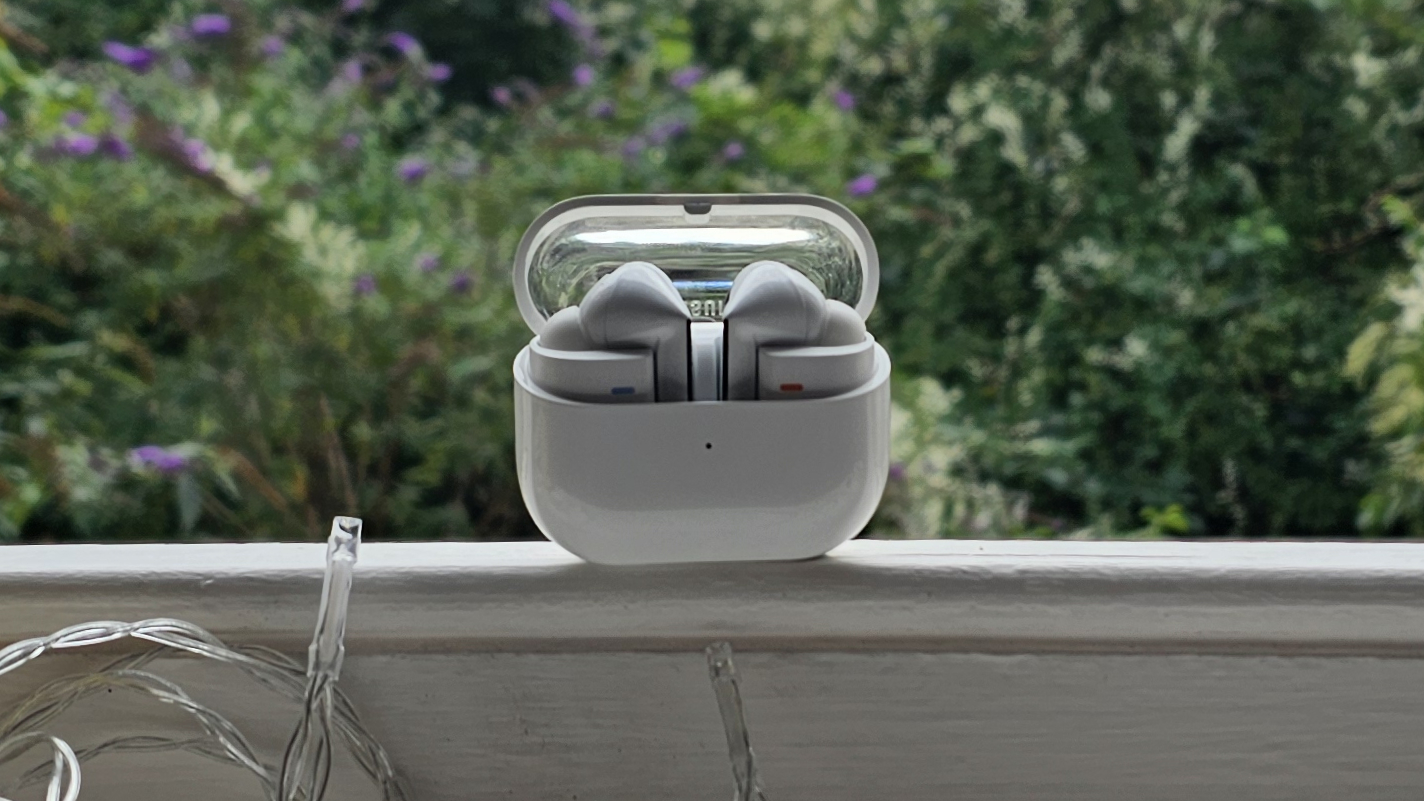
- Unveiled on July 10, 2024, alongside Buds 3
- Cost $249 / £219 / AU$399
- Price increase over 2022 Buds 2 Pro
The Galaxy Buds 3 Pro were announced on July 10, 2024 alongside other products, including the non-Pro alternatives. At the time of writing, release date delays mean you can pre-order them, but in the UK at least Samsung's checkout informs you to 'Order now to receive from 22 August'.
You can pick up the buds for $249 / £219 / AU$399, so they’re pricey buds which also present a small price hike over their $229 / £219 / AU$349 predecessors. The Buds 3 are much cheaper at $179 / £159 / AU$299, but at a time when competition is fierce and most manufacturers are shaving extra dollars (or pounds) off new propositions, a $20 increase is a bold strategy from Samsung.
Depending on where you live, these buds are therefore as expensive as, or slightly cheaper than, the $249 / £229 / AU$399 AirPods Pro 2 – but bear in mind that the Apple earbuds' advanced age means they're now regularly available for less than those quoted prices.
You’ll be able to find more competitors below, but know for now that these are some of the priciest earbuds that general consumers might opt to buy. Deep-wallet audiophiles have plenty more options though.
Samsung Galaxy Buds 3 Pro review: Specs
| Drivers | 10mm dynamic driver + planar tweeter |
| Active noise cancellation | Yes |
| Battery life | 7 hours (buds) 30 hours (case) |
| Weight | 5.4g (buds) 46.5g (case) |
| Connectivity | Bluetooth 5.4 |
| Waterproofing | IP57 |
Samsung Galaxy Buds 3 Pro review: Features
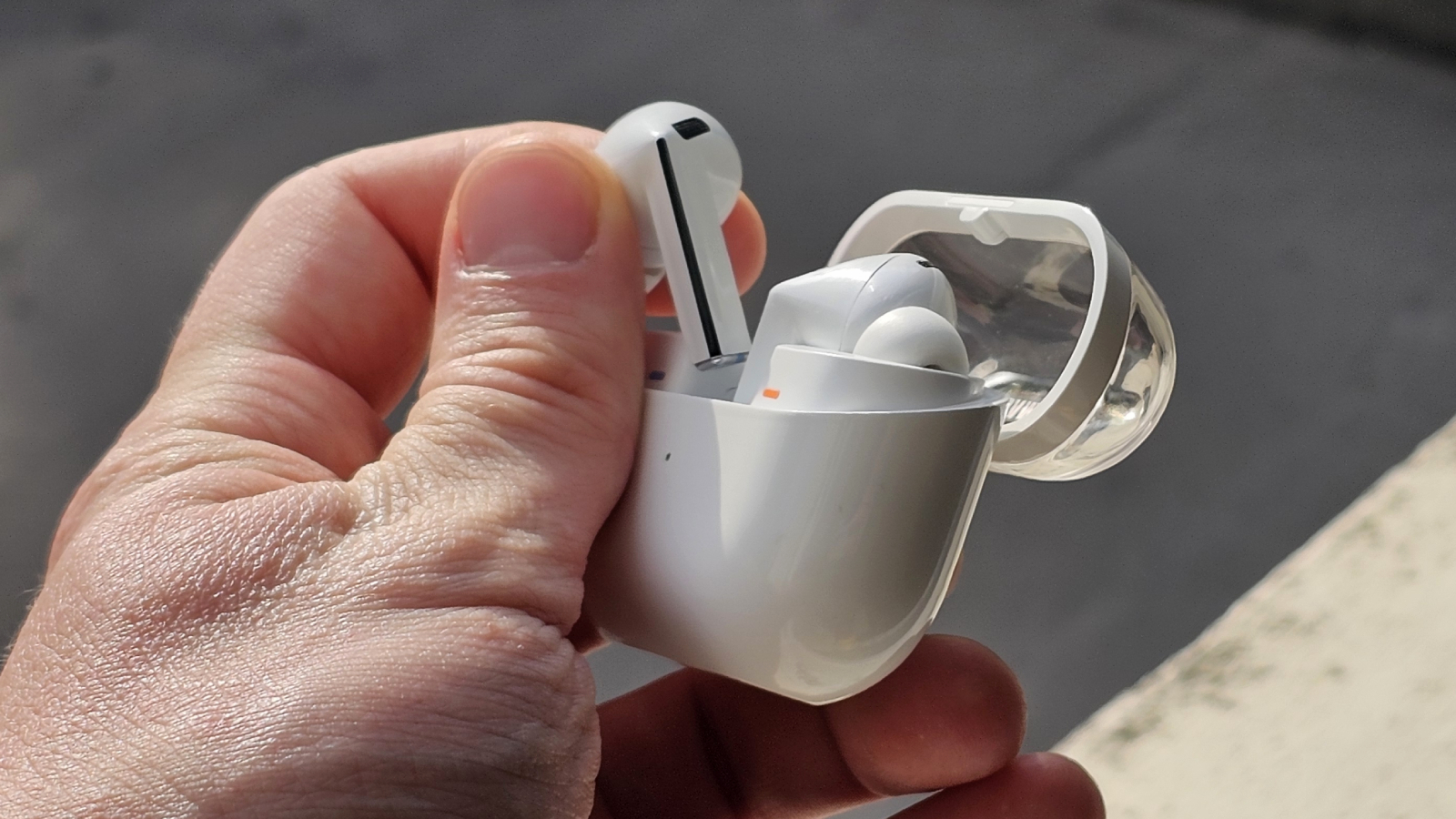
- 6-hour buds battery, 30-hour with case, longer with ANC off
- Noise cancellation is heavy-duty and impressive
- Galaxy-exclusive features aren't all that handy
One of our biggest gripes with the Galaxy Buds 2 Pro was their limited battery life; you’ll be glad to know that the Samsung Galaxy Buds 3 Pro improve on that staying power. It’s not a huge increase, but it’s something.
According to Samsung the buds will last for 6 hours if ANC is turned on, and an extra hour on top of that if it’s off. After my testing, I’d concur with this estimate – though when I tried to do unbroken playback tests, the buds would turn off when out of my ear for 15 minutes, even when auto-detect was turned off. The charging case rounds those totals up to 26 (ANC on) or 30 (ANC off) hours of stamina, and you can charge this case wirelessly as well as with a USB-C cable.
I can see how some people would consider 6 hours still far too short for an earbud's battery life, and I’m in the same camp. That’s why the battery life isn’t on the review’s ‘cons’ list any more, but hasn’t made it to the ‘pros’ one.
So what of that ANC, or Active Noise Cancellation? Generally, it’s really great – the buds throw a blanket over whatever background noise is going on when you’re trying to listen to music. I’ve just moved into a flat backing onto a rail line and I could rarely tell when trains were passing when using the earbuds. This was on the maximum intensity mode, of course, but the others work well if you still want some surrounding awareness.
The Samsung Wearable app does offer two further modes: Ambient and Adaptive (the latter exclusive to Samsung users, more on that later). Ostensibly the former is to allow certain background noises to penetrate a mid-level noise cancellation, while the latter changes your ANC based on your environment, but in practice these both seemed to have exactly the same result.
Wearable, the Buds’ companion app, is a little barebones compared to the wider world of earbuds tie-in software. It lets you tweak with the ANC, change on-ear controls, tweak with an equaliser and do a few other small tasks, but I didn’t find myself using it very much. In fact, of the two phones I tested the Galaxy Buds alongside, for one of them (the non-Galaxy one) I didn’t even download the app, and found the buds worked just fine.
So let’s get onto that Samsung-related issue, which you’ve already seen listed in the ‘cons’ section of the review.
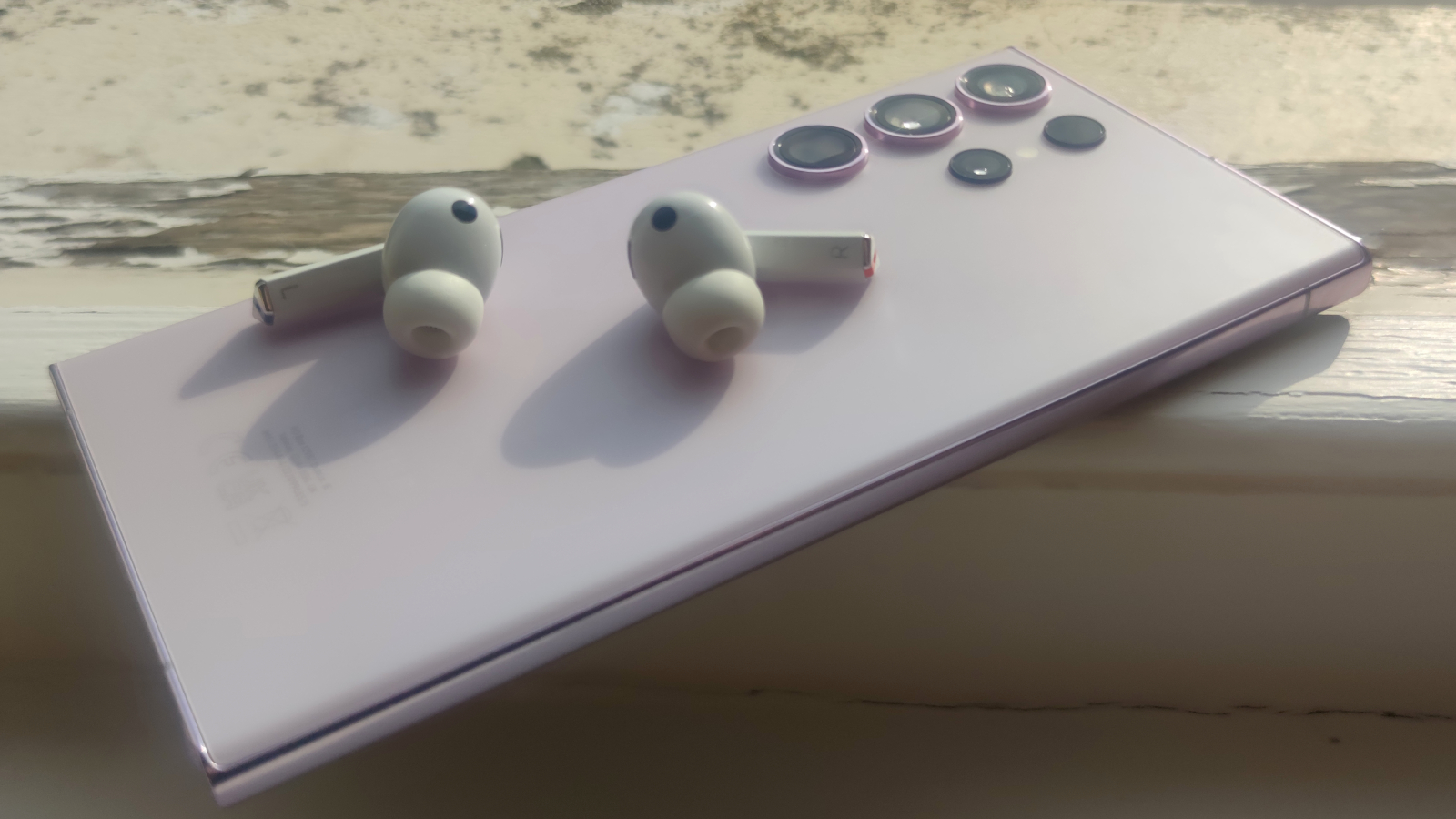
The Galaxy AI features, which include the adaptive ANC, a feature which restores crackling voice in poor-quality calls and a much-touted live audio translation feature, are all exclusive to people who own a top-end Samsung smartphone. Already, non-Samsung users may be closing their web page… but this ‘con’ isn’t as much of a ‘con’ as you’d think, for better or worse.
As I’ve mentioned, the adaptive ANC didn’t seem to add much, and I didn’t get to test the call quality improver since I didn’t experience any bad phone calls over testing. I tried to use the translation feature but I couldn’t see how the buds really added anything to the apps’ equation. The way it’s meant to work is that you can say something in one language and it’s translated into another, so two people who speak different languages can maintain a conversation. And that’s true without the earbuds, so you don’t need to buy them to use the feature.
This is all to say, the Galaxy AI features aren’t really that important in the overall picture of the Galaxy Buds 3 Pro, so your lack of a Samsung smartphone shouldn’t put you off buying the earbuds. Some other exclusive features that don’t fall under the Galaxy AI umbrella include multipoint pairing to two Galaxy devices only, better quality audio using Samsung's 24-bit/96kHz new SSC UHQ codec, and audio casting to various devices. I only used the Buds alongside one Samsung device so couldn’t use most of these.
It’s a shame that Samsung has opted to put some of the features you’re paying for behind a pay-wall, especially when perks like adaptive ANC and multi-point pairing are commonplace in cheaper earbuds, but I don’t imagine many Samsung customers will use these either feature.
A few Galaxy Buds 3 Pro features are open to everyone, and they’re pretty handy. The 360 audio works well for immersive sound, with head tracking adding a little bit for those who don’t find it disconcerting, plus an earbud fit test helps you work out which tips to use (if you think you can handle changing them!).
The buds pack Bluetooth 5.4 which is reliable and can let you listen over relatively long distances from your phone. Through the entire testing process I didn’t have a single issue with drop-outs or connection problems.
One final thing I want to flag is that, unlike the vast majority of earbuds, wear detection doesn’t come enabled by default. For a large part of the testing I thought the buds didn’t have it; they do, you just need to toggle it on in the app.
- Features score: 4/5
Samsung Galaxy Buds 3 Pro review: Design
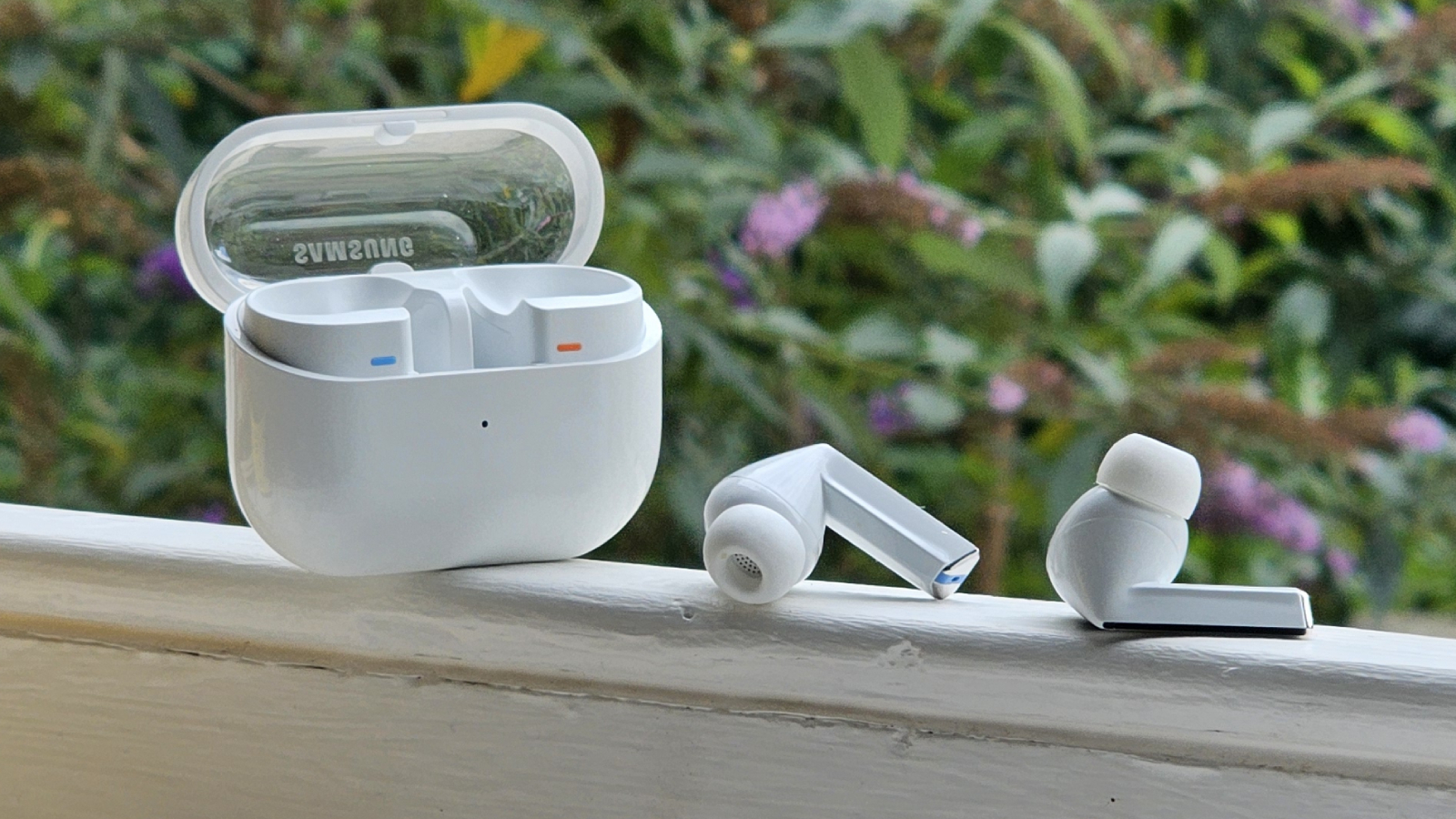
- AirPods lookalikes with Toblerone stem
- Sit comfortably in ears, but replacing tips is a nightmare
- 5.4g per bud and 46.5g for case, with IP57 protection
For the Galaxy Buds 3 Pro, Samsung has steered away from the pebble-body design ethos of the Buds 2 Pro towards a more AirPods Pro-like design, featuring a tip, a small body and stems that point down towards the floor.
The design is close in plenty of ways to those Apple ones, with tips that point down at an angle, the clean white design of the default model and even the silver trim around the edges of the stem. The only major difference is that instead of being rounded, the stem is prismic like a Toblerone chocolate bar.
White isn’t the only color option, as there’s also a black one for sale, and each has a small hint of color in the form of red and blue dots that correlate to spaces in the charging case, so you know which bud goes where.
The stems also have what Samsung is calling a 'blade light', or a small LED strip over the ridge to act as an indicator. Of what? I couldn’t tell, and given that you can’t see the earbuds when they’re in use, it seems like a gimmicky feature to me. You can use the stems for controls too: swiping up and down to change the volume was easy but due to the prism shape of the stem, trying to pinch it to pause music was a faff.
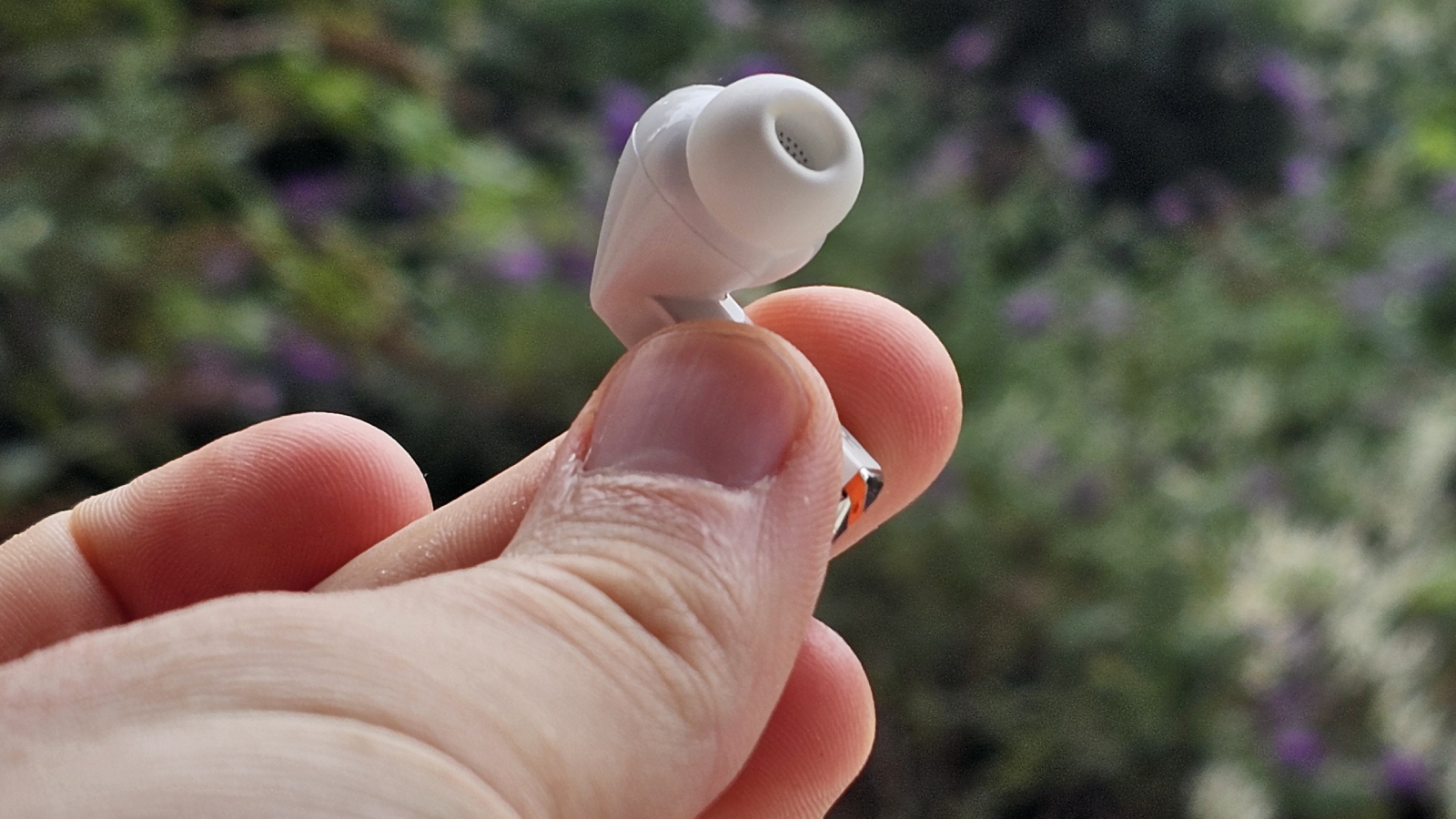
Each earbud weighs a gentle 5.4g and I found they fit quite comfortably and reliably in the ear, never falling out or causing earache from the weight. They’re IP57 rated, which means they’re protected from dust to a limited degree, and will survive immersion in water of up to 1 meter deep for a short amount of time.
A major problem with the Galaxy Buds 3 Pro, that we’ve already covered extensively, pertains to replacing the eartips. Samsung uses a home-brewed clasping system to hold its tips in place, that’s similar to something Apple does but is different to the vast majority of earbuds manufacturers.
To put it simply, the eartips are held in place incredibly firmly, and are pretty hard to remove from the buds when you want to change sizes. People have reported tearing the tips when trying to remove them, and I gouged out a chunk with my nail by accident when trying to do the same. I found that the best way to remove the tips is to pinch as near to the buds themselves as possible when pulling, but honestly if you are worried about the risk of breaking your earbuds, you may consider looking at the non-Pro options instead.
The other design aspect of the Buds 3 Pro is the case, a lightweight 46.5g plastic container that’s not too big. It has an LED charging light, USB-C charging port, reset button; the usual accoutrements. As a fan of see-through charging cases I was happy to see a little viewing port in the Buds’ case.
- Design score: 3.5/5
Samsung Galaxy Buds 3 Pro review: Sound quality
- Bass-heavy sound
- Treble is lacking
- Equalizer lets you tweak sound to an extent
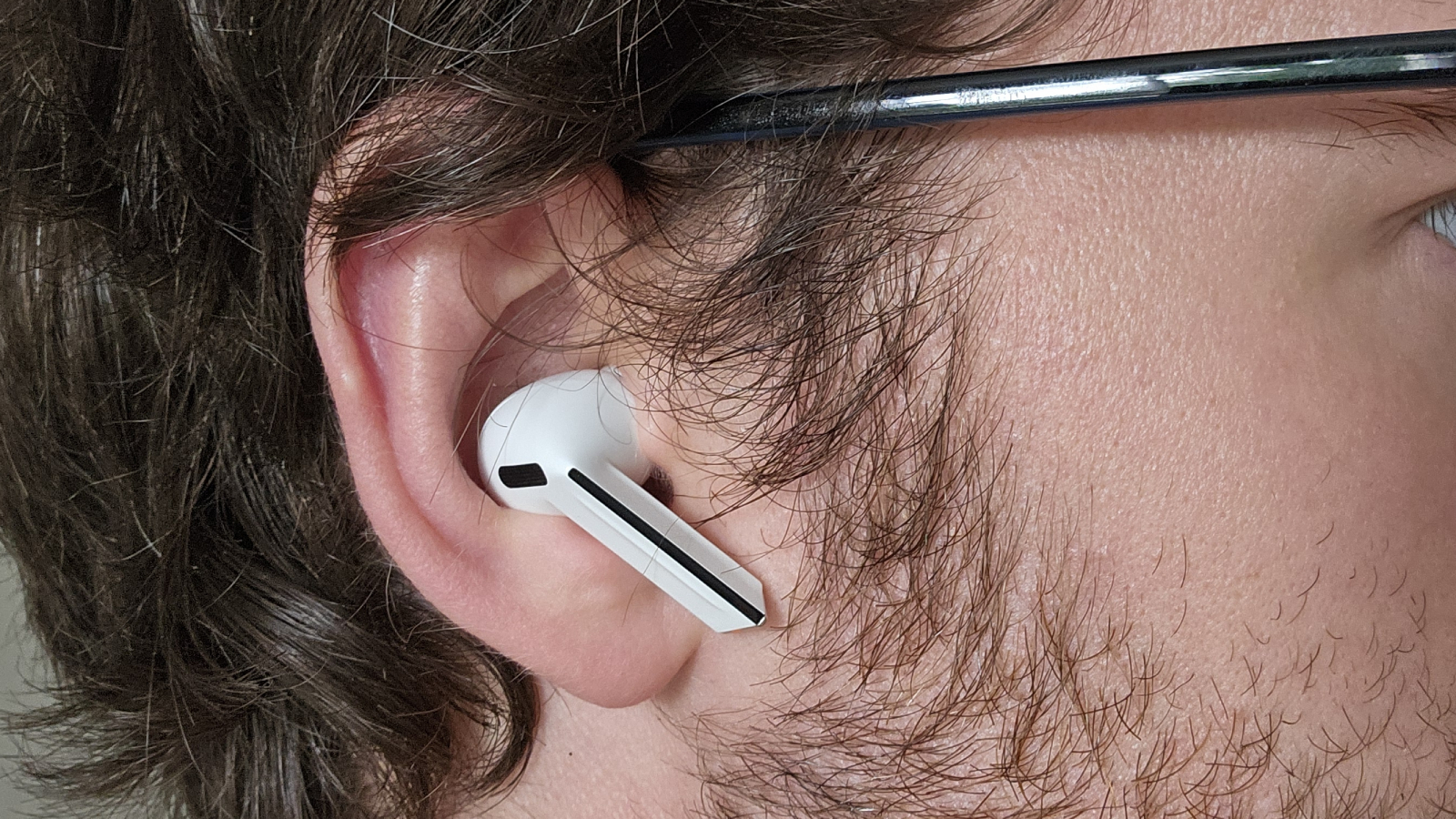
The Samsung Galaxy Buds 3 Pro are some of the best wireless earbuds I’ve tested for sound, and they’ve got a grocery list of fancy-sounding technologies to back up that statement.
There’s the Samsung Seamless Codec, which compresses and decodes music of up to 24-bit/96kHz when used with Samsung Galaxy S23 or later, Samsung Galaxy Z Fold 5 / Z Flip 5 or later, or Tab S9 series. The company calls this Ultra High Quality Sound (note the caps!) and it cetainly is that. Then, there's the two-way speaker which includes both a woofer and tweeter, plus Adaptive EQ which uses AI to detect your listening and tweak the equalizer as a result (another Galaxy-locked device which curiously I couldn’t find on my Samsung Galaxy S23 Ultra).
Whatever jargon Samsung throws at you, and however much you understand it, there’s one thing to say for sure: the Buds 3 Pro sound great.
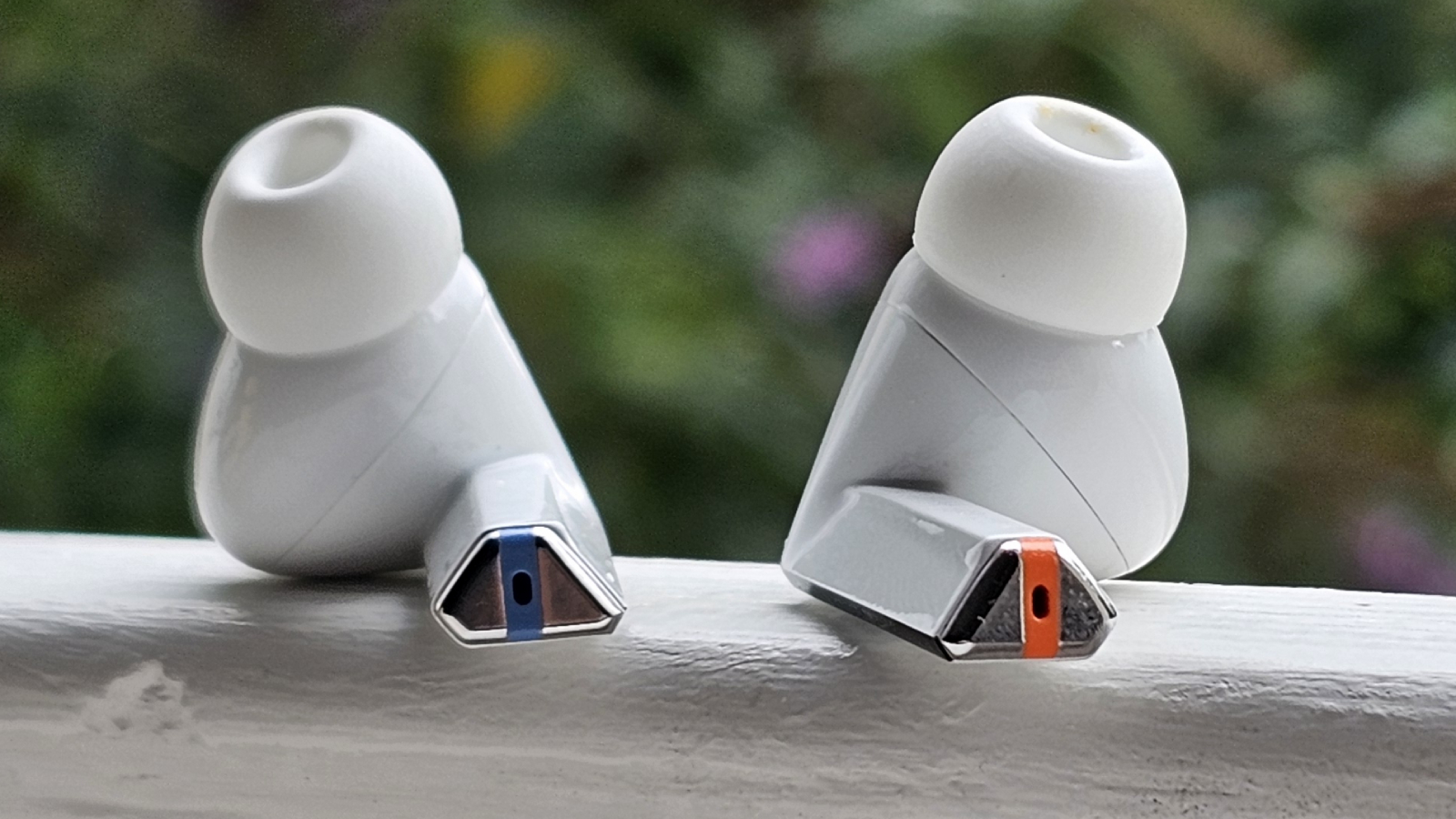
The Buds have a V-shaped sound, which means that both the bass and treble are elevated and distinct, while the mids are just a little stepped back. Some could consider this the optimal type of sound signature as it caters to both bass-heads and treble fans. Listening to a song, you can appreciate the bassline and drum kicks just as much as the vocal melody or guitar solo, and music is dynamic and full of energy as a result. It creates a wide sound stage and you feel that different instruments are really around you.
If I were being pedantic, I’d say the that the treble sounds just a little more elevated than the bass, and you can ‘feel’ the bass a bit more than you can ‘hear’ it, but this is nit-picking for sure.
As is the natural effect of V-shaped audio, mid sounds are a little further back in the mix. I’m personally a fan of the mids (a mid fan? Or does that sound like I’m only half a fan?) so this was a shame, but I found the equalizer was handy and let me bring them up in the mix. The presets will also be useful here.
I was impressed by the maximum volume of the Galaxy Buds 3 Pro: too many earbuds think an audible level of output is optional, but Samsung clearly disagrees. You can get a nice meaty output if you want, and I didn’t linger too long in the higher-volume areas for fear of harming my hearing.
- Sound quality: 4.5/5
Samsung Galaxy Buds 3 Pro review: Value
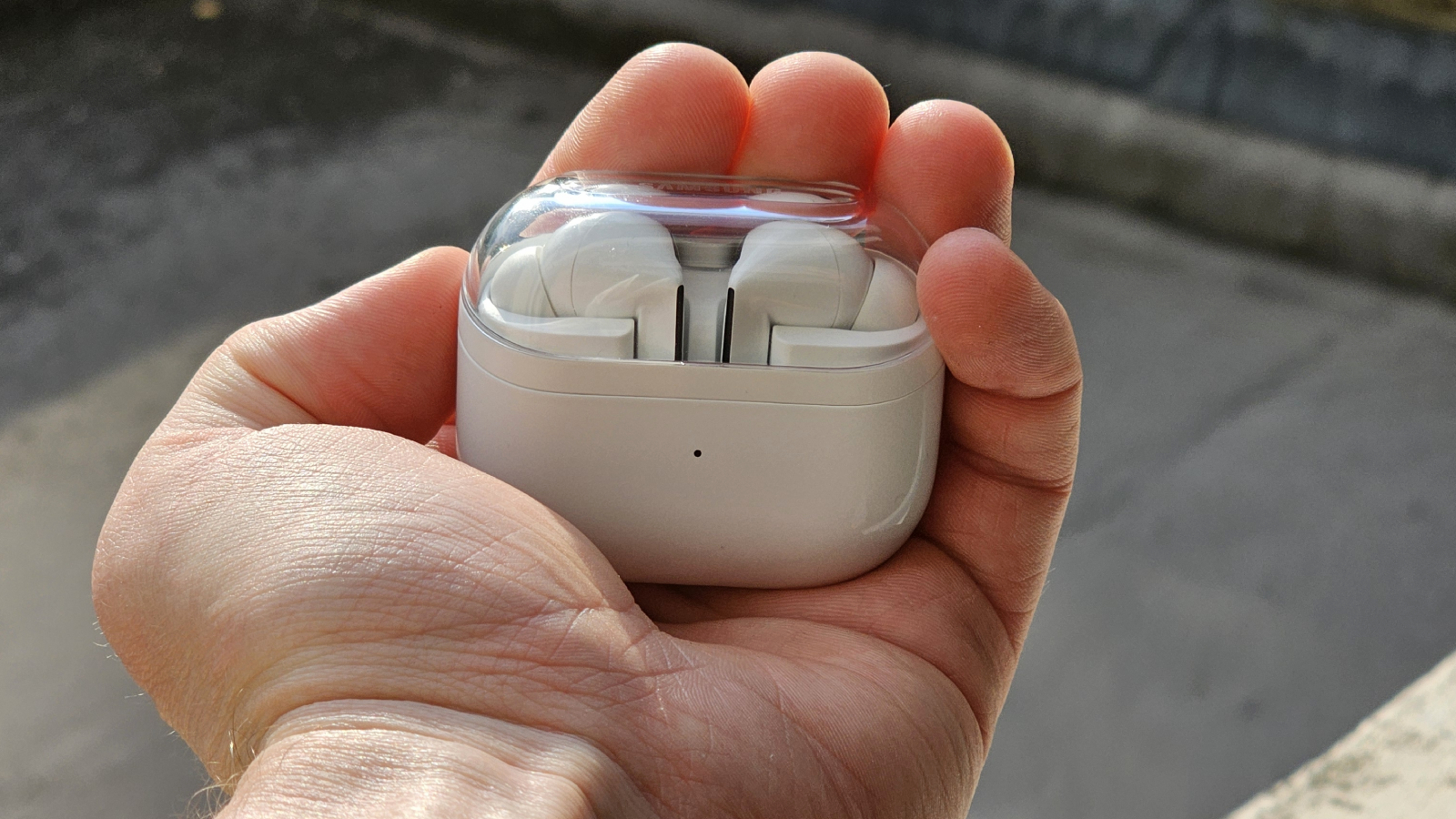
- Top-tier earbuds that come with a fittingly high price
- More affordable options exist
It’s hard to keep a straight face when considering the value proposition of the Samsung Galaxy Buds 3 Pro, given that they’re some of the most expensive earbuds designed for general consumers.
There’s no doubt that these are top-end earbuds, especially in the audio quality and noise cancellation departments, and if money is no concern then you’re looking in the right place for your new set of buds.
But if you want to make sure your cash goes as far as it possibly can, there are a plethora of more affordable options that offer competitive sound, a bigger range of features and a longer-lasting battery life. Plus, most let you change the eartips without shredding them…
- Value: 3.5/5
Should I buy the Samsung Galaxy Buds 3 Pro?
| Attributes | Notes | Rating |
|---|---|---|
| Features | The less useful features are locked behind a paywall, but stellar ANC makes up for it. | 4/5 |
| Design | These lightweight buds have an originality problem... and worse, a design nuisance. | 3.5/5 |
| Sound quality | These Samsung buds sound fantastic, with a high max volume and useful EQ just adding to the magic. | 4.5/5 |
| Value | These buds are valuable, but that doesn't mean they offer value for money | 3.5/5 |
Buy them if...
You already own a new Samsung phone
The whole quandary about spending extra to get the Galaxy AI features is moot if you already have a compatible Samsung smartphone.
You need something to cancel the noise
As I've said, I was mightily impressed with the Galaxy Buds 3 Pro's ANC. Simply put, it eradicates more background noises than most rivals I've tested.
You have a diverse music taste
I found the Buds 3 Pro's sound profile was just as appropriate for rock as it is for jazz, hip-hop, folk, classical, spoken word and so on.
Don’t buy them if…
You're on a budget
The Samsung Galaxy Buds 3 Pro are certainly top-end earbuds and they'll hurt the bank account, so they're not for everyone.
You like to replace ear tips
The Samsungs, like most earbuds, come with different-sized ear tips. However, unless you've nimble fingers, you might find the process of switching them out more stress than it's worth.
Samsung Galaxy Buds 3 Pro review: Also consider
| Samsung Galaxy Buds 3 Pro | Apple AirPods Pro 2 | Sony WF-1000XM5 | Samsung Galaxy Buds 2 Pro | |
|---|---|---|---|---|
| Drivers | 10mm dynamic driver + planar tweeter | 11mm driver | 8.4mm Dynamic driver X | 10mm woofer & 5.4mm tweeter |
| Active noise cancellation | Yes | Yes | Yes | Yes |
| Battery life | 7 hours (buds) 30 hours (case) | 6 hours (buds); 30 hours (case) | 8 hours (buds) 24 hours total (with case) | 5 hours (buds) 18 hours total (with case) |
| Weight | 5.4g (buds) | 5.3g (buds) | 4.2g (buds) | 5.5g (buds) |
| Connectivity | Bluetooth 5.4 | Bluetooth 5.3 | Bluetooth 5.3 | Bluetooth 5.3 |
| Waterproofing | IP57 | IP54 | IPX4 | IPX7 |
Apple AirPods Pro 2
Apple's iconic top-end earbuds cost roughly the same as the new Samsungs, and look incredibly similar too. You can only use these if you're an iPhone or iPad user though.
See our full Apple AirPods Pro 2 review
Sony WF-1000XM5
Some of our favorite earbuds right now are Sony's top-end WF-1000XM5s. They're slightly pricier than Samsung or Apple's rivals but provide great music, a long-lasting battery and a solid in-ear fit.
See our full Sony WF-1000XM5 review
How I tested the Samsung Galaxy Buds 3 Pro
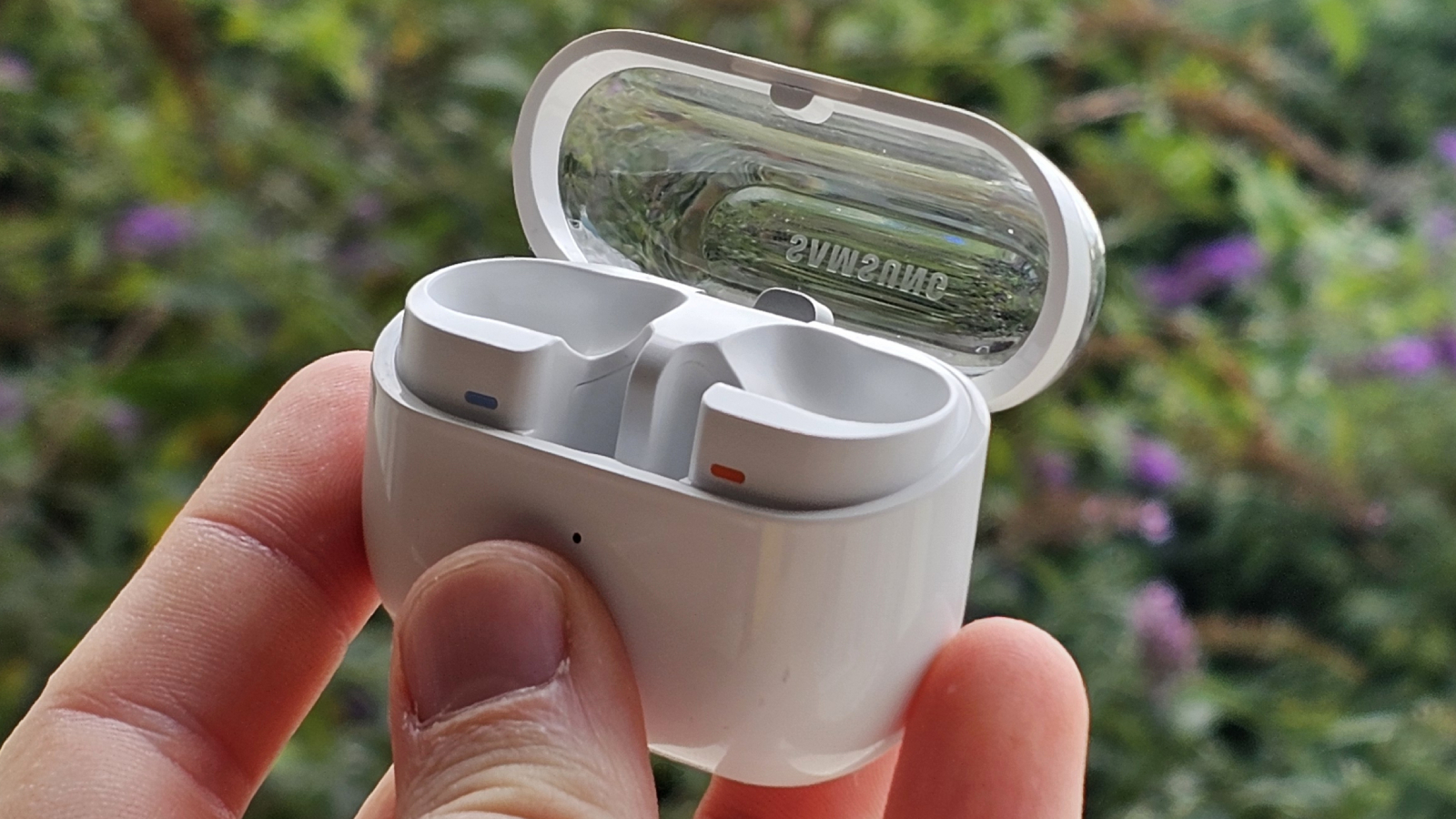
- Tested for 2 weeks
- Tested at home, in the office and on walks
I used the Samsung Galaxy Buds 3 Pro for over two weeks to test them, and together we enjoyed a wide range of trials and tribulations.
Paired alongside (varyingly) a Xiaomi Mi Note 10 or Samsung Galaxy S23 Ultra, I used them in the office, on walks around neighbourhoods of varying noise levels, on trains, on a run once and also while in my new flat (that backs onto a railway and is also under a flight path. I know).
They got to cancel a lot of noise, and I generally relied on the top-tier form of ANC on the Buds 3 Pro as a result. In terms of EQ, I generally relied on the default option but did play around a little bit for testing purposes.
I mostly listened using Tidal, Spotify, Netflix or YouTube, mainly relying on the former for testing with music and audio books.
My tech reviewing history for TechRadar spans more than five years now, including countless earbuds and other Samsung products; in fact the first ever launch event I attended was for the original Samsung Galaxy Buds (and the Galaxy S10). So I've got a wealth of experience with gadgets such as this.
- First reviewed in July 2024

Tom Bedford is a freelance contributor covering tech, entertainment and gaming. Beyond TechRadar, he has bylines on sites including GamesRadar, Digital Trends, WhattoWatch and BGR. From 2019 to 2022 he was on the TechRadar team as the staff writer and then deputy editor for the mobile team.

